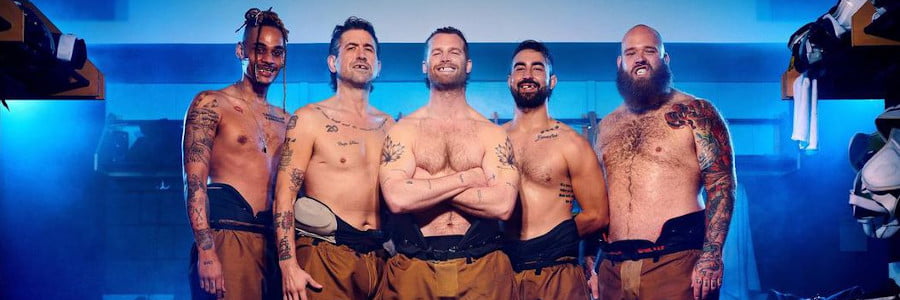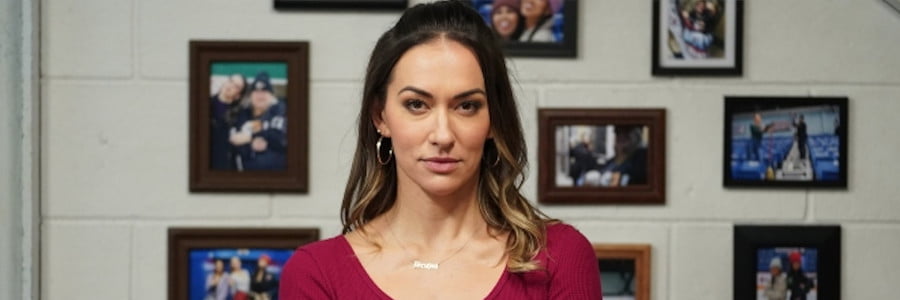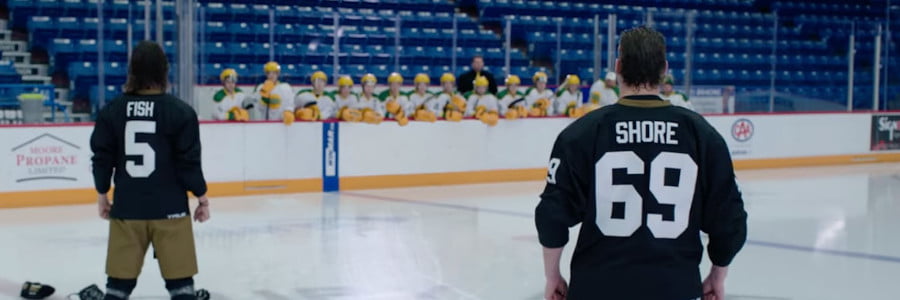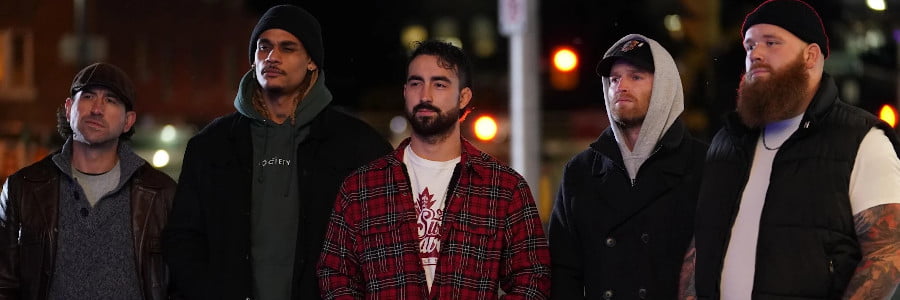Hahn?

Shoresy is a six-episode comedy-sports-drama TV series from Canadia, a spinoff of the series Letterkenny made by and starring Jared Keeso as the title character, Shoresy, a foulmouthed hockey player who loves playing hockey and bread (even though he’s gluten intolerant) and apparently, in Letterkenny, people’s mothers. The series is a classic sports drama about a loser team, that in the first episode sets a rule to keep the team from folding, a promise:
This team will never lose again.
What you get after that is watching Shoresy, with the help of the team’s management, rearranging the team, recruiting friends who are available, and turning the team into a legitimate threat to try and live up to that boast. Because it’s not just about hockey players who want to win, it’s, very importantly, about hating to lose.
It’s a real killer of a show, honestly, I really liked it, and while I watched it I thought about how I could use Gina Bloom’s Gaming the Stage to map the way the game treats hockey as a character. And then I decided I shouldn’t do that, because I don’t know hockey. Not really. I know it in a top-down, away-from-the-culture way, a look-up-the-rulebooks way.
Instead, I decided to interrogate why I was even watching the show I figured I wouldn’t. See, I wasn’t planning on watching Shoresy for the same reason I stopped watching Letterkenny around season 7.

When I wrote about Letterkenny it was a conflicted feeling. Specifically, it was the way season 7, episode 5, W’s Talk, Baby showed the normally goodnatured show deciding to swerve over into a cul-de-sac to make a point in its narrative that women aren’t as good at hockey as men. That women can’t play hockey with men. That even trying is a guarantee of failure, and all the people who thought they could were women who then got showed they’re stupid and wrong, and then also that the whole thing was watched by an audience who showed up to hear the male players humiliate the women players who stepped up to try.
Then the plot resolved by the women quitting half-way to show that they were actually so smart because they gave up. Basically they wrote women to enter a space, humiliated them there, and had the women they wrote step out going ‘oh yeah you’re right.’
It sucked.
It sucked as well because it felt like the whole thing was Thinking Up A Girl And Getting Mad At Her — trying to turn a bunch of characters in-universe who did have some reason to know better into stupid internet commentators, or trying to involve a sense of realism in no-stakes ice hockey that you made up.
It was the worst episode of the series and for a time it really made me pump the brakes on recommending Lettekenny, a show that was normally very good about handling people with differences. The comedy derived from either some really righteous targets, or from people who were all around the same level being awkward around one another. It turned me off enough that I stopped watching the show, and especially stopped liking Shoresy, the character, for making some flat out transphobic jokes on the ice.
I wasn’t going to try Shoresy, because of that.
I wound up trying out Shoresy because Adam Savidan of Loading Ready Run remarked about how much he liked it, about how authentic it felt, and about how it surprised him. I didn’t even realise that there was going to be a Shoresy TV series, and then hey, it was done and available for me to watch in its entirety. Adam talked about how the series was essentially an excellent sports movie that had enough room to properly represent progress over time.
Anyway, so I stole it.
And…
Man, it’s really good?

One part of how the series is better is that Shoresy’s softened here. Oh sure he’s always talking about railing people’s mothers as well, but first, these grotesque conquests appear to be actually happening, and they also seem to be related to Shoresy’s tastes in women.
Shoresy isn’t winning all the time either. He might have been the best player in the town of Letterkenny, but out here, he’s not that special. Also, he’s not good enough that he can stand out on a team that sucks and get put on a team that doesn’t suck. Something about having a terrible personality that makes everyone hate him? He is in a hell of his own making, the Northern Ontario Senior Hockey Organization (NOSHO) Sudbury Bulldogs, the worst team in a league nobody cares about that is still the closest he can get to playing professional hockey.
This Shoresy isn’t a caricature chirping in from the other side of the screen during a scene where someone else is in the foreground here. The way that Letterkenny characters tend to be some bundle of awkwardness pulled together in a heap had to work on Shoresy too, so he’s now no longer this sex beast hockey god, ruining the day of everyone on the team, but he’s this falsetto-voiced toothless wannabe who cries all the time and has anxiety poops and likes older women because he never had a mother.
We get to see more of the story around Shoresy, and how terrible he is at relating to people with any kind of filter; when he’s actually attracted to someone he finds charming he has no option but to just dumpster his positive thoughts in front of her. The way he relates to his family is one of insults and japes but so do they, and it makes a lot of sense that Shoresy’s so terrible at realising there are times to not behave like that because around the people he loves the most, it’s just how you do.
There’s also a broadening of the base of the story: Shoresy is the centerpiece of the narrative but he’s surrounded by a bunch of equally ridiculous hockey players (and hockey player enthusiasts), and a lot of his sniping is reserved for sniping with teenagers he coaches. There’s also, very importantly to me, a sequence where the teenagers correctly identify a good topic to chirp at him over, and do so…
… and Shoresy nods.
Because yeah, it’s a good hit. Nothing to do but eat it.
It shows some vulnerability, and Shoresy as a character wears it, then learns to cope with it.
There’s more to it, of course. There’s the way women are shown in the show – not as players (thankfully, given last time Keeso handled that), but rather as managers and community members, the people around the space of hockey. It also isn’t as overwhelmingly white — It centers the experiences of a variety of Canadians, including black Canadians and Indigenous Canadians and even has a Newfoundlander who’s treated as a friendly guy that everyone likes.

I think the thing that W’s Talk did was remind me that while I liked Letterkenny it wasn’t being made for me. It was being made for someone who did some things I liked and still had some shitty opinions and ideas, or at least, some shitty ways of expressing them. And that’s just there, it’s just part of the story and it sucks. But what did I expect? My opinion of Letterkenny, my opinion of Jared Keeso, were both diminished, and it was a good enough reason to drop the media for a while there, but also…
What was I expecting?
As with all media, there’s no veganism here. You’re always going to have some stuff from people who suck involved in it these days.
Shoresy is a fun show, and I like a lot of the things it talks about. It seems like it has a handle on hockey, as a game, it seems like it uses a lot of clever rules and rulings about the way the game is actually played, about strategy and ways of viewing the game and how that creates relationship dynamics with the players within the game, too. It seems like the kind of thing I, a person who cares about media and games and games in media, would have opinions on.
Thing is, it’d be really easy to stand here and point to examples that comply with my academic model, but without knowing hockey, without knowing if that’s how it feels, if that’s how the game works, from the inside, it’s a great big pile of what the hell do I know?
I really enjoyed Shoresy, it was exactly long enough to not outstay its welcome, I want to believe it’s a good show that’s well made and sounds like extremely rough dudes trying to be good friends to one another, and it’s made from an authentic place of loving hockey and wanting to be better.
But that’s kinda what it wants me to think, don’t it?